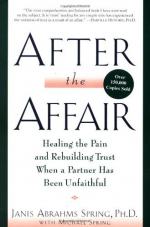
|
| Name: _________________________ | Period: ___________________ |
This test consists of 15 multiple choice questions and 5 short answer questions.
Multiple Choice Questions
1. Many people erroneously feel that their partners should be able to sense which of the following?
(a) Their demands.
(b) Their needs.
(c) Their hurt.
(d) Their frustration.
2. Which is an assumption about sexual intimacy by many couples?
(a) It will decrease during the marriage.
(b) It should come easily and naturally.
(c) It could be regained in a relationship.
(d) It would be more exciting with a lover.
3. Exploring and learning about the affair is achieved through which process?
(a) Intimate talk.
(b) Accepting the affair.
(c) Open communication.
(d) Forgiving the unfaithful partner.
4. Forgiveness can be described in which way?
(a) As an outcome.
(b) As a reality.
(c) As a process.
(d) As a need.
5. Destructive behaviors can be forgiven without which of the following?
(a) Understanding.
(b) Acknowledgment.
(c) Acceptance.
(d) Recommitment.
6. In addition to feeling safe, children also need to feel which emotion?
(a) Wanted.
(b) Loved.
(c) Cherished.
(d) Secure.
7. An individual could mistakenly assume that listening gives their partner freedom to act with which emotion?
(a) Jeaousy.
(b) Rage.
(c) Blame.
(d) Fear.
8. If one of their parents was unfaithful, a person will most likely exhibit which behavior?
(a) Seek out a partner who will commit equally.
(b) Refuse to enter a relationship.
(c) Become an unfaithful partner in their marriage.
(d) Avoid an affair at all cost.
9. A list is provided in Chapter 8 to help people understand the common areas of shame associated with which of the following?
(a) Their fantasies.
(b) Their expectations.
(c) Their desires.
(d) Their bodies.
10. What is the root cause of the majority of marital dysfunction?
(a) Failure to communicate.
(b) Incompatable personalities.
(c) Extramarital affairs.
(d) Financial disagreements.
11. The genuine intention of an individual may be lost if the partner feels the behavior is only occurring for which reason?
(a) Because their marriage was damaged.
(b) Because the affair was ended.
(c) Because they were asked to change.
(d) Because they did not want to hurt the children.
12. For communication to occur in the marriage, what must happen with the lover?
(a) The unfaithful partner must end the relationship with the lover.
(b) The unfaithful partner mus understand their attraction to the lover.
(c) The hurt partner must confront the lover.
(d) The hurt partner must accept the lover.
13. Why do unfaithful partners feel pressure to perform sex at a high satisfactory level with their partner?
(a) To regain sexual intimacy with the hurt partner.
(b) To prove the marriage is worth salvaging.
(c) To avoid the hurt partner fearing the affair is continuing.
(d) To compensate for the loss of the lover.
14. A partner may refuse to discuss the affair because of which false assumption?
(a) It will send the unfaithful partner back to the lover.
(b) It will bring additional pain into the marriage.
(c) It will not be taken seriously by the hurt partner.
(d) It will cause deeper wounds in the relationship.
15. Post-affair testing for AIDS is described in which way?
(a) Optional for the unfaithful partner.
(b) Necessary for both partners.
(c) Important for the lover.
(d) Too emotional to be discussed.
Short Answer Questions
1. How does the book view sex tools?
2. When trust has been destroyed, which emotion is logically prevalent?
3. Why do some individuals refuse to change?
4. Who do children need to value in their lives?
5. According to Chapter 6, how can trust be restored in a person?
|
This section contains 579 words (approx. 2 pages at 300 words per page) |

|




